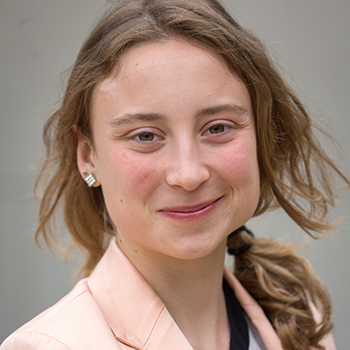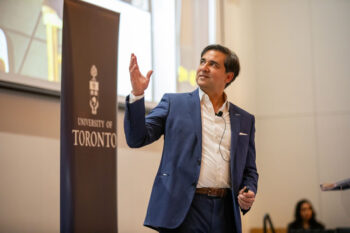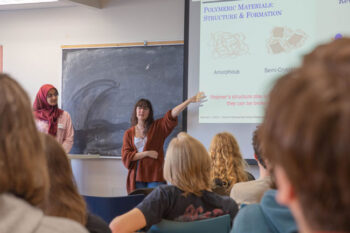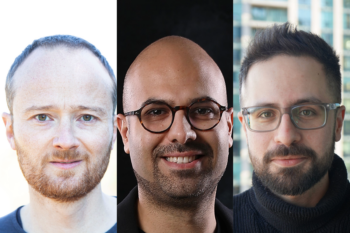Six U of T Engineering graduate students have been named 2018 recipients of the prestigious Vanier Canada Graduate Scholarships. Worth $50,000 a year over three years, for a total of $150,000, The funding supports leading-edge doctoral research, including projects on human-robot interaction, therapeutic applications of reversing blindness, and investigating chronic pain, among others.
The Vanier Scholarship recognizes doctoral students at Canadian universities who demonstrate excellence academics, research impact and leadership.
This year’s recipients are:
 Amin Kamaleddin Ezabadi (IBBME PhD candidate)
Amin Kamaleddin Ezabadi (IBBME PhD candidate)
Chronic pain is a highly prevalent health condition. In many cases, patients are prescribed painkillers, such as opioids, to manage symptoms. These opioids produce unforeseen adverse effects, and can be highly addictive. Kamaleddin Ezabadi, who is supervised by SickKids Hospital clinician-scientist Dr. Steven Prescott, who is cross-appointed to IBBME, is identifying drug targets at a molecular level to develop clinically-effective treatments for chronic pain.
Neurological disorders account for 38 per cent of human diseases, which is higher than cancer and cardiovascular disease combined. “I feel a responsibility to lead in my research specialization. I want to create a more scientifically advanced tomorrow, but also be a leader and coach within the scientific community,” said Ezabadi.
“The support from Vanier will not only further strengthen my research strategy, but it will also ensure that the outputs from this research inform clinical practice at the earliest possible stage.”
 Surath Gomis (ECE PhD candidate)
Surath Gomis (ECE PhD candidate)
Gomis works under the supervision of Professor Ted Sargent (ECE) and co-supervisor Professor Shana Kelley of the Leslie Dan Faculty of Pharmacy. As part of a collaborative team in U of T’s Medicine by Design, Gomis’s work focuses on designing microfluidic devices to characterize and sort retinal stem cells — a rare cell type with promising therapeutic applications of reversing blindness due to degenerative eye disease.
His work provides some of the first insights into retinal stem cell morphology in the push to advance their translation to the clinic.
“This recognition encourages me to think outside of the box and to continue tackling challenging problems in engineering and medicine,” says Gomis. “I would like to thank Professor Sargent and Professor Kelley for their immense support through my early graduate career, and all my colleagues and mentors from the years past who have supported my aspirations in the field.”
 Chaim Katz (IBBME PhD candidate)
Chaim Katz (IBBME PhD candidate)
Katz is investigating deep brain stimulation — the process by which electrical pulses are delivered to the brain to regulate its activity — to learn how the process can be used to improve memory and alleviate the cognitive effects of, and lend insight to, memory modification for other neurodegenerative diseases.
“It is a great honour to be a recipient of the Vanier. For the next three years, I can focus completely on my research without financial concerns and will have the time to connect with innovative researchers in the field,” he said.
 Hannah Kozlowski (IBBME MD/PhD candidate)
Hannah Kozlowski (IBBME MD/PhD candidate)
Millions of people worldwide suffer from infectious diseases such as HIV, hepatitis and influenza. Medical diagnostic tests are used to identify infectious organisms, but these existing tests are imperfect, as microorganisms are constantly changing.Kozlowski, under the supervision of Professor Warren Chan (IBBME), looking to improve current diagnostic tests by creating an algorithm that looks at changes in microorganisms and uses that information to predict whether a test will provide a true diagnosis.
“The Vanier scholarship is a way for me to meet like-minded peers from whom I can learn from and learn with. The funding support also enables me to pursue opportunities with collaborators outside the University of Toronto, thereby allowing me to learn new skills that I can bring back and use here at U of T,” said Kozlowski.
 Shane Saunderson (MIE PhD candidate)
Shane Saunderson (MIE PhD candidate)
Under the supervision of Professor Goldie Nejat (MIE), Saunderson’s research looks towards a future where social robots become nearly ubiquitous and are required to take on a variety of roles that collaborate with humans. He is currently investigating how interactions with robots influence and affect humans, particularly in roles involving trust, persuasion, and empathy.
“The word ‘humbling’ doesn’t even begin to describe how I felt upon receiving my acknowledgement,” he said. “Knowing the exceptional academic talent across Canada, I feel both an immense honour and a good bit of pressure to ensure that I make good use of this opportunity. Moreover, I view this scholarship as validation that my intuition and passion around Human-Robot Interaction are equally valued by the Vanier community and viewed as a critical to Canada’s social and economic future.”
 Trevor Stirling (ECE PhD candidate)
Trevor Stirling (ECE PhD candidate)
Stirling studies under the supervision of Professor Amr Helmy (ECE), working on the design and implementation of entangled photon lasers on silicon-based computer chips.
These devices will be used to interconnect quantum bits on chip to help realize scalable quantum computing, as well as provide a platform for further research into the applications of quantum light.
Stirling balances his research with the rigorous training and travelling schedule of a competitive athlete — he has represented Canada in trampoline at international competitions around the world.
“It is a great honour to be selected as a Vanier scholar and that my research under Professor Helmy has been acknowledged to have the potential to make an impact within Canada and around the world,” said Stirling. “Receiving this award will allow me the freedom to pursue my research interests, and to continue to train and compete in the sport of trampoline.”



